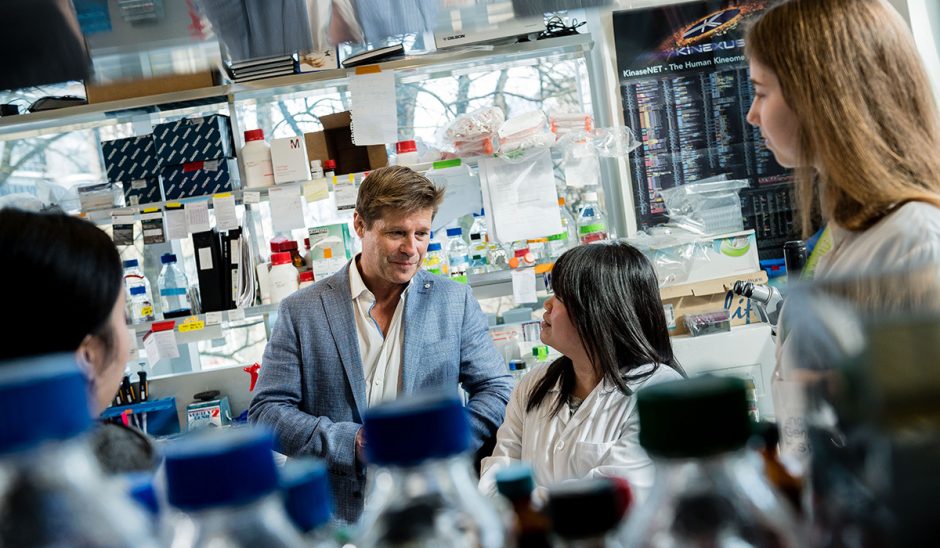Bringing cancer breakthroughs to patients faster than ever
From genomics to biophysics, UBC’s Vancouver Prostate Centre tackles prostate cancer from every conceivable angle. The results are inspiring.

Prostate cancer is the most common cancer in Canadian men, and deadlier than most people realize — one quarter of prostate cancers outlast treatment and evolve into a more lethal form.
The Vancouver Prostate Centre (VPC), a research hub hosted by UBC and the Vancouver Coastal Health Research Institute, is leading the global push for lifesaving treatments — and demonstrating how a rigorous, multidisciplinary, bench-to-bedside approach can accelerate drug development.
“In the past decade, eight new drugs have been approved that have doubled overall survival in patients with treatment-resistant prostate cancer,” says Dr. Martin Gleave, VPC’s executive director and co-founder, and a professor of Urologic Sciences at UBC.
One of the world’s most respected cancer research facilities, the VPC brings together scientists from the fields of genomics, oncology, medical genetics, biology, computer science and biophysics — including multiple Canada Research Chairs and other globally recognized experts — to tackle prostate cancer from every conceivable angle.
“The key to our success is coordination at every step of the way,” Dr. Gleave says.
new cancer drugs approved for patient use over the past decade
new clinical trials enrolling 2,886 patients since 2008
increase in overall survival of patients with treatment-resistant prostate cancer

This approach has enabled a team led by Dr. Amina Zoubeidi, Canada Research Chair in Cancer Therapy Resistance, to develop the first-ever drug that blocks the growth of neuroendocrine prostate cancer tumours
At the same time, Dr. Artem Cherkasov, a recent recipient of a Canada Research Chair in Computer-aided Drug Design, has created a promising drug that could shrink a wide range of prostate tumours and prevent the growth of new ones.
“We can now better understand how cancers evolve to become aggressive, and how to design ways to attack them,” says Dr. Zoubeidi.
VPC scientists also translate their research breakthroughs into powerful mapping and monitoring tools to track the evolution of treatment-resistant prostate cancers in real time. Using this information, clinicians can provide more effective treatments tailored to the biology of individual patients. Clinical trials of novel targeted gene therapies are currently underway.
To support their work, the VPC maintains close links with local and international biotech and pharmaceutical companies so that the process of testing and commercialization can begin as soon as a promising treatment is modelled. The end goal is always to translate clinical research discoveries into patient-ready treatments as safely and quickly as possible.
“At the VPC we have a whole pipeline of potential high-value drugs,” Dr. Gleave says. “By working with industry, we can move these discoveries into treatments that will make a difference for patients and their families.”


